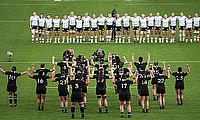Maggie Alphonsi - Professionalism and Rugby

Hi all rugby fans! I have been asked by Talking Rugby Union to start writing a blog. I obviously couldn't turn down an opportunity to talk about myself and rugby as it's the only two topics I know incredibly well!!! Right where do I start? Well I thought for my very first blog I would write about the life of an international rugby player and the challenge between balancing work and playing sport at an international level.
Playing rugby is the sport I love and I started playing rugby at the young age of 14 years old. I remember the early stages of my rugby career being full of fun. I remember turning up to the club on a Sunday morning and it being brimming and vibrant and full of mini's and parents. I distinctly remember the wofting smell of chips and burgers in the air and seeing mud everywhere, even though it did say quite clearly 'no boots allowed in the clubhouse' it rarely was adhered too. Rugby back then was all about turning up with your boots and gum shield and just playing with your mates. It's funny because rugby was something I just did. I had no stresses, no worries and no complaints.
Now let's fast forward 14 years later. Rugby for me is a lot different. I now have responsibilities. I have a job and ambitions to develop my career outside of rugby but how do you do that whilst playing rugby at a high level. Does an athlete have to make a choice or can an athlete do both? Can they develop their chosen career whilst giving less to their sport or only concentrate on their sport and giving less to their career? I don't think there is a correct answer to this because rugby for women is changing. The game is becoming more and more professional and the athletes within the women's game are being presented with different challenges. Who would have thought 5 years ago that women would be playing on the greatest of stages around the world and people would be taking notice and more female rugby players being recognised and rewarded for their efforts.
With professionalism comes more commitment though and with more commitment there is less flexibility and ones choices become limited. The challenges that now face women rugby players are when do they start planning for their careers? Do they start planning early into their sporting career or do they leave it until they have finished their sporting career and retirement is upon them. This is the question I am constantly asked as a rugby player and within my current job role. My honest opinions are that if athletes can combine both then they should do this but this is easier said than done. This is not just a problem in rugby but young athletes in other sports are also faced with the same dilemma. I am lucky I have managed to do my rugby and still obtain an education and establish a good working career. I work for the RFU as a Divisional Talent Development Officer where I manage the London and South East Divisional Programme. I have also obtained a BSc in Sport and Exercise Science and an MSc in Sport and Exercise Science: Assessment Support. In another 5 years options for women rugby players could change and we could see athletes being paid to play and becoming professional. Plus we could see the increase in the profile of the sport and see more athletes being used as commentators and making guest appearances on high profile TV programs.
For many athletes, professionalism is what they crave but when it comes and goes will they be prepared to return back to the reality of the real world? I look at all the athletes I once inspired to be like and I wonder where they are now? I was really fascinated after watching the documentary program Sporting Heroes on BBC1 a few weeks ago as it really opened up my eyes to the lives of some of the well-known athletes we use to know, and seeing what they went through and what they are doing now. It intrigued me because I thought life was great for them all and they were all still living the dream after their retirement but this was not the case as life for them now was very different from what they use to do. What struck me was how unprepared some of the athletes were for their retirement. The issues that present women rugby players are not that different and we cannot ignore them but it is how we support the athlete that is what is important. Those days of turning up to the club and just playing have not gone but it is a lot different now. I am not just that 14 year old anymore I am now a 28 year old with a career so the best advice I can give to the next generation of athletes coming through is that you can never be too prepared so if you can invest into your future now do so.









